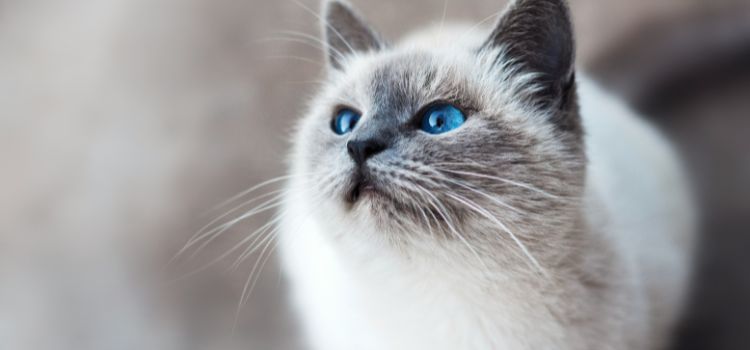As an Amazon Associate I earn from qualifying purchases.
What Does It Mean When Your Cat is Breathing Fast?
Knowing the rhythm and patterns of respiration in your cat can be one of the most important indicators of their general health. Cats breathing rapidly does not always indicate that they are distressed, but knowing when to worry may save their lives. This exhaustive guide for cat owners aims to help them understand subtle changes in breathing patterns that distinguish their cats’ respiratory conditions.

Introduction
Understanding the beats and rhythms of a cat’s normal breath could help you pick up possible medical problems before they become an emergency. Differentiating between normal variations in respiration due to exercise or temperature changes and abnormal breath rates signaling health problems is essential.
Why Is My Cat Breathing Fast?
Generally, cats tend to breathe more quickly when they are hot, agitated, or after exertion. However, if such rapid breathing occurs without an obvious cause (e.g., recent activity) then this should prompt further investigation.
Kitten Breathing Fast While Sleeping
Small kittens often breathe quickly during sleep as their metabolic rates are higher. Dreaming or REM (Rapid Eye Movement) sleep may also increase respiratory rate temporarily.
Cat Breathing Heavily While Resting
Heavy breathing by your cat while relaxed could mean that there is an underlying medical condition such as heart or respiratory issues. It would be advisable to monitor the situation and consult with a veterinarian.
Cat Breathing Fast but Otherwise Normal
Some cats might have fast breathing without any other sign. Though it might just be nothing serious, if it’s a recurrent phenomenon or accompanied by behavioral changes, kindly pay a visit to your vet.
Normal and Abnormal In the Cat
However, differentiating between fast breathing that is normal the abnormal fast one is crucial among cats. If your cat breathes very rapidly for no reason apparent to you or long periods without stopping it may suggest that something wrong has occurred within its system. Some reasons why cats have abnormal fast breathing include:
1. Respiratory Infections: Upper respiratory infections such as feline viral rhinotracheitis or feline calicivirus can make the respiratory tract congested and inflame it causing rapid breathing.
2. Heart Disease: Some heart diseases like congestive heart failure or cardiomyopathy may reduce the pumping efficiency of the heart. Consequently, a cat might struggle to breathe hence manifesting rapid breathing rates.
3. Asthma: Feline asthma is characterized by inflammation and constriction of airways in cats. Rapid breathing, wheezing, and coughing are common clinical signs of this condition.
4. Pleural Effusion: This refers to an accumulation of fluid in the space between the lungs and the chest wall. It leads to labored breathing as well as rapid, shallow breaths in affected cats.
5. Anemia: Decreased red blood cell count reduces oxygen levels throughout your cat’s body leading to increased respiratory efforts and faster breathing.
6. Pain or Stress: Cats that are sick or stressed may start panting at a very high rate because they are trying to respond to what they feel is hurting them.
These are just some of the few things that can result in quick breath in cats. It is crucial to remember that every cat is unique and the cause behind it may be different. If you notice your cat breathing rapidly and are unsure of the cause, always consult with a veterinarian. They will perform a thorough examination, run any necessary tests, and provide appropriate treatment if necessary.
Normal Cat Breath Rate
Expected rates and patterns
The normal respiratory rate for adult cats at rest is 20-30 breaths per minute.
Cat Breaths Per Minute
To determine your cat’s respiratory rate, watch for one full minute the rise and fall of its chest while it is resting.
Fast Breathing Signs in Cats
Quick breathing in cats can also be characterized by rapid breathing, panting, or open-mouth breathing. Panting is unusual in cats so this behaviour should not be ignored.
What Can Cause Fast Breathing?
Several things may lead to an increased respiratory rate in felines
Stress or anxiety: Atrial tumult from environmental adjustments or stressors might make a puss breathe rapidly
• Heat or exertion: A cat could breathe faster than usual when it is hot to bring down its body temperature, the same as human beings do when they sweat after play.
• Respiratory conditions or infections: Things like pneumonia or bronchitis could affect your pet’s respiration.
• Heart disease: Abnormal heart function affects oxygen level making it difficult for an animal to breathe without medical intervention.
• Allergies or asthma: This often results in hard breathing accompanied by wheezing sounds for affected animals
• Poisoning/toxicity: Exposure to toxins might result in an increased respiratory rate.
When Should You Get Veterinary Help?
If rapid breathing coexists with blue/pale gums/wheezing/coughing/lethargy, do not delay seeking veterinary attention.
At Home Care Tips
When your cat breathes rapidly?
Make sure they are in a quiet, cool place.
• Give them water to prevent dehydration.
• Get rid of any stressful stimuli.
• Keep track of breathing rates and patterns so that you can show your vet.
FAQs
How fast is normal for a cat to breathe?
The normal resting respiratory rate for cats should be approximately 20-30 breaths per minute.
Can cats breathe fast?
Consistently rapid respirations in cats are not normal although moderate increases may be seen during certain activities
Do kittens have fast breathing?
Yes, kittens have faster breathing rates than adults, especially when sleeping.
Conclusion
Being observant about the way your cat breathes has significant implications for early detection of potential health problems. Changes in this regard must be addressed promptly to ensure the well-being of your pet.
By being aware of ‘normal rr for cats’, understanding why ‘cat breathing fast’, and knowing what counts as ‘normal cat respiration rate’, you will be better positioned to take care of your feline friend. Thus, it is always safe to say that in case one is not sure what the matter is it is only prudent to consult a professional veterinarian instead.
With such knowledge about feline respiratory rate, you can make life more comfortable for your beloved pet by acting swiftly whenever the need arises. Even though some terms like ‘cat respiration rate’ sound technical or complicated just stay alert and committed to caring. So continue watching with love and learning from these furry fellows as well.
Amazon and the Amazon logo are trademarks of Amazon.com, Inc, or its affiliates.
